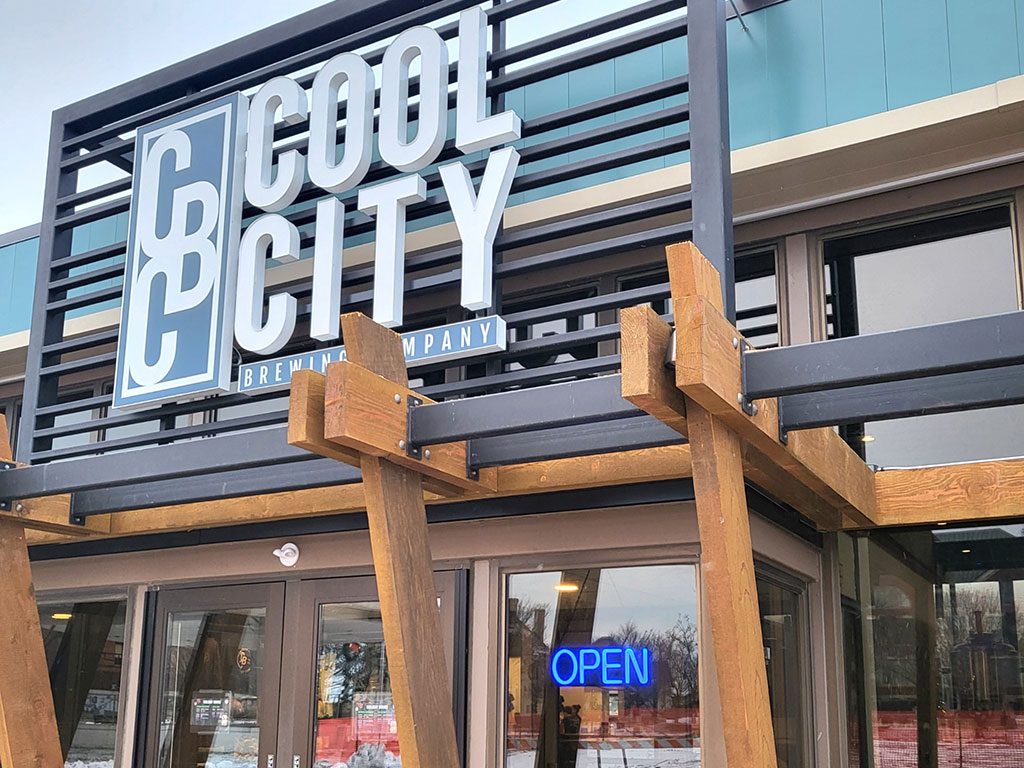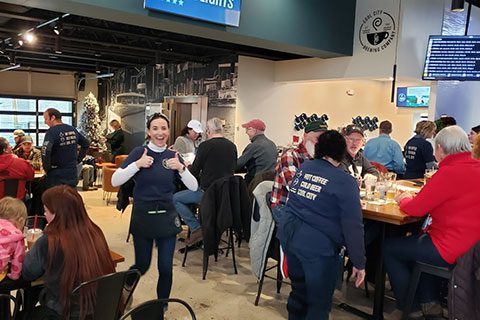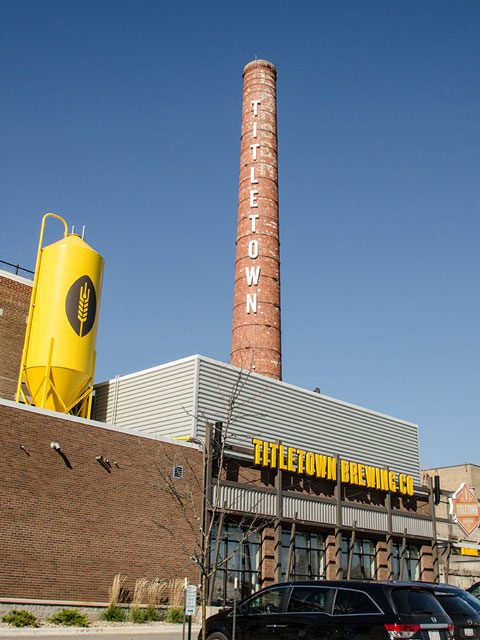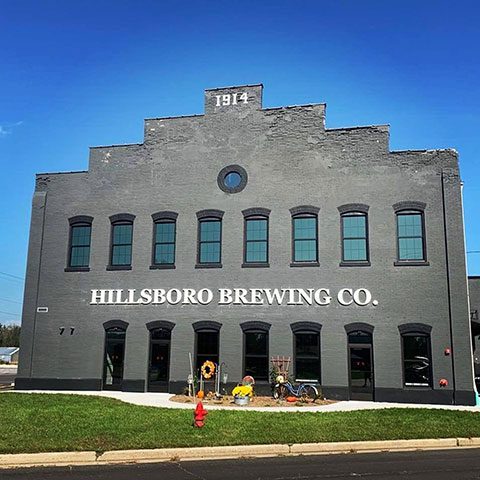
A Community Development Investment Grant from WEDC helped turn a former Wells Fargo bank building into the home of Cool City Brewing in Two Rivers.
Brewing—a historic mainstay of Wisconsin’s economy—was enjoying a rebirth around the state when the pandemic bellied up to the bar.
Like other hospitality businesses, craft brewers struggled as people avoided gathering at their usual watering holes and restaurants. But Main Street Bounceback Grants helped many of Wisconsin’s small brewers keep their footing, emerge from the crisis, and tap into success.
In all, 37 breweries around the state—from Three Lakes to Janesville and New Richmond to Milwaukee—were awarded a total of $370,000 through the pandemic response grant program, which was designed to help business owners open or expand in vacant storefronts.
“We hear from community leaders everywhere that the Main Street Bounceback Grants are transforming their downtowns,” said Missy Hughes, WEDC secretary and CEO. “It’s not just the businesses that receive the grants that are benefiting. Their neighbors also tell us they see an increase in foot traffic and feel a sense of excitement as their downtowns grow.”
The new program provided an additional tool for supporting businesses’ success, but even before the pandemic, craft breweries were leveraging WEDC’s assistance to generate jobs and economic activity.
These businesses also build community. Errin Welty, WEDC’s senior downtown development director, said brewpubs are an important social engine prized by people in their towns.

Breweries often serve as community gathering spaces.
“Breweries are a natural gathering place in their local community or neighborhood whenever they open. Not only do they promote local pride with locally branded items, but they tend to welcome a wide cross-section of the community,” Welty said. “As opposed to traditional downtown bars, breweries are often seen as family-friendly and offer patios or yards that encourage the community to come together, making them a beloved business wherever they appear.”
While Wisconsin currently lacks comprehensive studies of the statewide impact of the brewing industry, there is an abundance of evidence that beer makers are having a big impact on their communities.
For example, a $250,000 Community Development Investment Grant helped repurpose a former Wells Fargo bank into the Cool City Brewing Co. on West Park Street in Two Rivers. The brewery also received a Main Street Bounceback Grant.
“Two Rivers has a heritage of beer manufacturing, and we’re bringing that entrepreneurial spirit back. We’re really excited about what it’s going to do for the community,” said Curt Andrews, who purchased the building with his wife and another couple.
The brewery has a restaurant, a bar, and a coffee shop, and offers seating for 140 patrons indoors and 80 outdoors. Andrews plans to partner with local businesses such as bakeries and other purveyors to supply the operation.
“We can help their businesses grow as well. This will bring some economic inspiration downtown,” he added.
WEDC also supported one of the larger brewing projects in the state, a $62 million expansion at Waunakee’s Octopi Brewing, by providing $800,000 in state tax credits over the next five years. The contract beverage manufacturer and packager plans create 150 jobs during that time.
“When we started, we had six employees, and now we have over 200 full-time employees with amazing benefits and great wages,” said Isaac Showaki, founder and president of Octopi Brewing. “It’s pretty fulfilling to see how many people are part of Octopi and how many families are able to develop through that.”

Titletown Brewing Co. received Historic Preservation Tax Credits for renovating the former Larson Canning in Green Bay.
An earlier $15 million expansion of Octopi won a $300,000 low-interest loan and created an added 13 jobs.
A $250,000 Community Development Investment Grant also helped fuel an expansion of Inventors Brewpub in Port Washington. Inventors is building a new harborfront brewpub, restaurant, and event space in the heart of the city.
“We are excited to serve the community with a much-needed event space, more local craft beer and to provide a central location where the community can gather and build Port Washington into a Great Lakes destination,” said Cameron Huck, the brewpub’s owner and general manager.
Some breweries that opted to renovate iconic buildings also benefitted from Historic Preservation Tax Credits through WEDC. The credits apply to certified historic buildings and help entrepreneurs bring new life to revitalize them. For example, the Titletown Brewing Co. in 2014 received a $220,000 credit for its renovation of Larson Canning in Green Bay.
Larger brewers also benefitted from WEDC assistance. An Enterprise Zone was created for Molson Coors Beverage in 2020 when it committed to retaining 500 jobs and adding another 377, which made the company eligible for $25 million in credits over eight years. That move followed the 2017 award of a $1.7 million tax credit and a $750,000 Workforce Training Grant to help the Milwaukee brewer open its global business center and launch a $50 million expansion of its 10th Street brewery.
Milwaukee may be Wisconsin’s historic epicenter of brewing, but smaller brewers there also benefited from Main Street Bounceback Grants—five in Milwaukee and two in West Allis.

Technical assistance from WEDC helped the Hillsboro Brewing Co. owners transform the former Carnation Milk Plant into an expanded facility that houses the brewery and pub under one roof, as well as a second-floor event space.
Technical assistance from WEDC also helped Hillsboro Brewing Co. owners Kim and Snapper Verbsky transform the former Carnation Milk Plant into an expanded facility that houses the brewery and pub under one roof. The renovation also provided the Vernon County brewer with a second-floor event space called willow+oak.
Wisconsin’s brewing tradition is thriving across the state thanks to creative entrepreneurs who have leveraged the range of tools offered by WEDC to turn taprooms into destinations, empty buildings into gathering spots, and their downtowns into lively social hubs.
